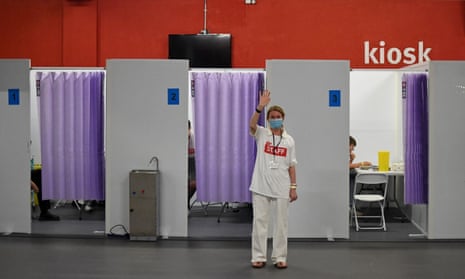Almost nine in 10 parents in England say they favour giving their children a Covid vaccine if they are offered it, according to a national survey released by the Office for National Statistics.
The survey of more than 4,400 parents with children under 16 and attending school found 88% said they would definitely or probably agree to vaccinate their child, with just 12% saying they would not favour vaccination.
The survey was conducted in April and May, before the Pfizer/BioNTech vaccine was given approval by the UK medicines regulator for children aged 12 to 15 at the start of June. The Joint Committee on Vaccination and Immunisation (JCVI) is expected to advise the government later this summer on whether to allow children over 12 to be vaccinated.
Prof Anthony Harnden, deputy chair of the JCVI, told the BBC: “JCVI are very aware of the issues surrounding both the pros and the cons of vaccinating their children, which we will talk about in due course, but actually what we need to be absolutely sure is that these vaccines benefit children in some way … so we are looking at this data very carefully.”
But Prof Calum Semple, a member of the Scientific Advisory Group for Emergencies (Sage), said not enough was known about possible side-effects if children were given Covid jabs.
“Vaccines are safe but not entirely risk-free. We are aware in adults about clots, and there’s some safety data from America showing rare heart problems associated with some of the vaccines. So until that data is really complete for children, I’m not persuaded that the risk benefit for children has been clarified,” Semple told the BBC, speaking in a personal capacity.
He added: “There’s very nuanced debate going on here but at the moment I don’t think there’s enough evidence to support vaccinating children.”
The debate over vaccinating children comes amid concern at the growing number of cases affecting school attendance in England, including 330,000 pupils absent in self-isolation last week, as the Delta variant continues to spread.
Gavin Williamson, the education secretary for England, has said he wants to end the use of self-isolation for pupils who have had close contact with a confirmed Covid case within school bubbles, while the prime minister’s spokesperson on Wednesday implied headteachers were being too quick to send pupils home.
But school leaders reacted angrily, saying they were following the rules laid down by the government and Public Health England that mandate self-isolation.
Geoff Barton, the general secretary of the Association of School and College Leaders, said in a letter to Boris Johnson: “We are dismayed by media reports that Downing Street appears to be suggesting that schools are being overzealous in their interpretation of government guidance on the management of Covid cases and that they are sending home too many pupils.
“This feels like a cynical attempt to shift the blame for your government’s failure to address the escalating educational disruption of recent weeks on to schools at a time when they are working under extraordinarily difficult circumstances to manage this deteriorating situation.”
Prof Russell Viner of the University College London institute of child health and former president of the Royal College of Paediatrics and Child Health, said the system of self-isolation for close contacts of positive cases within a school bubble had been “highly effective”.
Speaking at the Royal Society of Medicine (RSM) on Thursday, Viner said teenagers and children would become the primary source of infection for vulnerable individuals once most adults had been double-jabbed.
“Once vaccine supply is less of an issue and we have adequate safety data, my personal belief is that we should be vaccinating our teenagers at the same time as contributing towards international supply,” Viner said.
“Vaccinating all the adults has changed the dynamics of this pandemic. That’s one of the reasons, in my mind, that we should think about vaccinating [teenagers and children].”
Viner said the question of whether to vaccinate younger children under the age of 12 was a separate one, with little available safety data on the use of Covid-19 vaccines for that age group. “Young children have quite different immune responses to even older adolescents and adults, and that I think counsels caution,” Viner said.
The ONS survey found parents with children at secondary school were the most enthusiastic for vaccines, with 53% saying they would definitely support vaccination and just 4% saying they definitely would not. Nearly 35% of parents said they were “unsure but probably yes” in favour.
Among the parents of primary school-age children, 43% were definitely in favour and 46% were “unsure but probably yes” in favour of vaccination. Just 3% said they were “definitely” opposed, while a little more than 7% were recorded as “unsure but probably no”.
According to the ONS, the most common reasons given by parents opposed to vaccination were that not enough research had been done, or they wanted more information about long-term side-effects or had concerns over vaccine safety.
Barton said vaccinating pupils had “great potential to reduce educational disruption” but that the wait for the JCVI’s decision was frustrating: “We need to know whether or not it can be factored in as a potential solution because that then informs how we proceed in terms of other Covid control measures.”
Even though the risks to children and teenagers from catching Covid are very low, they are not entirely absent, said Prof Beate Kampmann, the director of the Vaccine Centre at the London School of Hygiene & Tropical Medicine, also addressing the RSM. “We have also seen the evolution of long Covid in children. It’s a rare condition but it can also be very debilitating,” Kampmann said.
